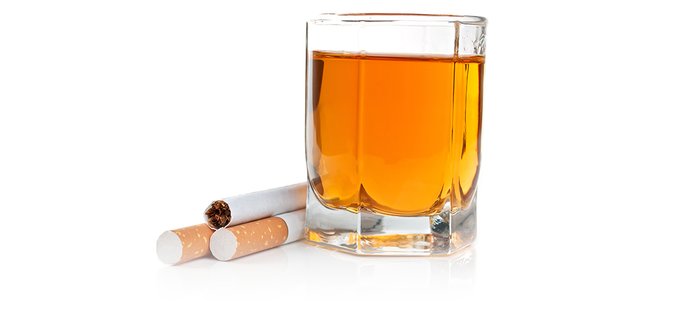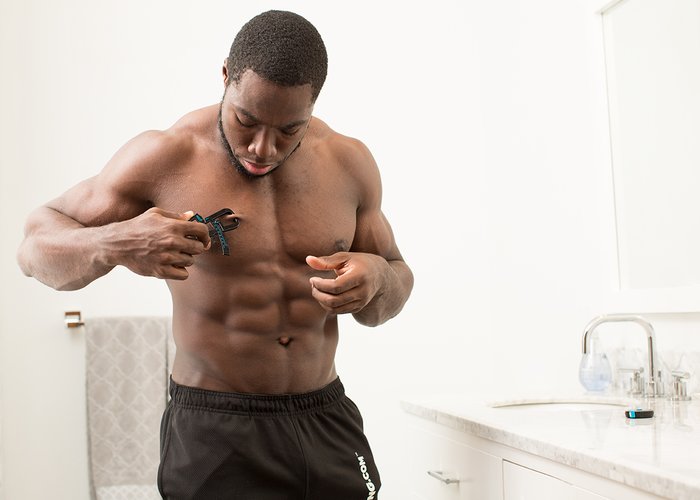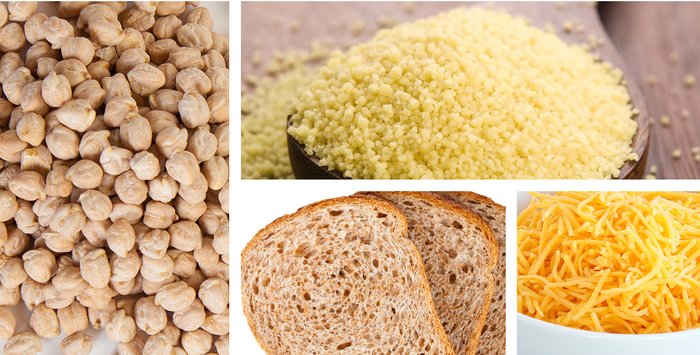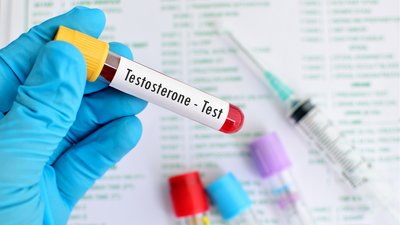It's hard to imagine one single word causing so many different responses and leading to so many arguments as "testosterone" does in the bodybuilder community. Gym talk about testosterone often centers on which exercises or performance-enhancing drugs or ancient, obscure herbs may—or may not—miraculously increase it.
Bodybuilding culture is geared toward exercises, programs, and foods that naturally boost testosterone levels. Even so, medical practitioners in the sport are becoming more comfortable prescribing testosterone replacement therapy for just about every aging male.
But let's get back to the basics and look at what testosterone does for lifters and what causes T levels to drop.
Don't stress out about getting old
The production of testosterone in the human body is governed by the hypothalamic-pituitary-adrenal axis (HPA), which directs the functioning of our endocrine and metabolic systems.[1] In both men and women, the hypothalamus sends signals to the gonads to create testosterone.
While people often think that testosterone production decreases as a result of aging, there is currently no research to support the belief that aging is the primary cause of lower-than-normal testosterone.
Research does show there has been a generational drop in what is considered "normal" testosterone. A 2007 study in The Journal of Clinical Endocrinology and Metabolism revealed that testosterone levels among U.S. men dropped by 17 percent from 1987 to 2004.[2] If this drop isn't due to aging, what is the cause?
Factor 1: Environmental toxins and free radical damage
The testes in men and the ovaries in women are extremely sensitive to factors both inside and outside the body. Internally, production of testosterone by the testes or ovaries can be diminished by the presence of reactive oxygen species. These "species" are molecules the body creates in response to stress from both environmental factors such as pollution and toxins, and from internal factors such as the wastes that are left over from intense exercise.[3]

You can't avoid the need to exercise to stay fit, but you can try as much as possible to avoid exposure to environmental stresses and toxins. Man-made chemicals found in plastic containers can cause a dip in your testosterone levels, as can alcohol, cigarettes, and recreational or antibiotic drugs.[4]
Factor 2: Increases in cortisol can lower testosterone
You may think staying up late a couple of nights each week is no big deal, but poor sleep patterns compound over time. Just one night of poor sleep increases cortisol, a catabolic hormone that breaks down muscle mass. Studies have shown that an increase in cortisol levels can lead to a decrease in testosterone levels.[5]

Physical stress also takes its toll on hormone levels. Overtraining closely correlates to high cortisol levels, so you aren't necessarily doing yourself any favors by thinking more training is always better. In fact, overtraining can lead to a drop in your testosterone levels.[6]
Adjusting your training volume, length, and intensity is the easiest way to reduce your stress load and prevent testosterone decline.
Factor 3: High body fat and fluctuating blood sugar
Excess body fat interferes with numerous hormonal systems, eventually leading to lowered testosterone production. High insulin levels, either from short-term cheat meals or long-term overeating, increases the activity of an enzyme found in fat tissue that converts testosterone to estrogen.[7,8]
There are numerous real-world scenarios where this high-estrogen imbalance occurs. Individuals whose total testosterone levels are normal but whose estrogen is too high can suffer from low testosterone production. Once the estrogen load is reduced, the testosterone is able to return to normal levels.

The easiest way to control these hormonal-imbalance scenarios is to reduce your body fat and avoid overeating. The best way to do that is to slowly and steadily reduce your body fat with a low carbohydrate diet.
Factor 4: Digestive health and liver function
Gut health and liver function are both integral to optimizing your testosterone. Excessive eating leads to hormone imbalance and added weight gain. It also stresses your digestive system, one of the key regulators of your overall health—and of your liver—which is the primary detoxifying organ in your body.
On top of the stress of overeating, many common foods can have an inflammatory effect on your digestive system. Immunogenic foods like corn, soy, gluten, dairy, and, in some cases, eggs can increase gut inflammation. Alcohol and prescription drugs can also cause stomach and liver inflammation.

The majority of our hormones are created in our gut, so stress and inflammation leads directly to hormonal problems. Problems with liver inflammation, digestive issues, or full blown "leaky gut" can lead to decreased testosterone.[9]
If your digestive system isn't operating optimally or your liver function is impaired due to poor lifestyle choices or stress, your body cannot properly manufacture hormones, and it will have trouble removing and eliminating the toxins that further decrease or inhibit testosterone.[10]
The testosterone boosting checklist
There are no quick approaches for fixing low testosterone, and to hack your hormones you have to think about the health of your entire body. Here are five ways you can boost your overall hormone health and bring your testosterone level back into balance.
- Eliminate toxins from your daily routine. Reduce your consumption of alcohol and avoid plastic containers.
- Get enough sleep. Sleep in a cold, dark room, and avoid screen time for at least 30 minutes prior to bedtime.
- Find ways to destress during the day. Book a massage, meditate, or practice breathing exercises. Reduce physical stress by lowering your total training volume and adjusting the intensity of your workouts.
- Lower your body fat by reducing total carbohydrate intake and watching your intake of foods such as gluten, corn, soy, and dairy. Get plenty of healthy fats such as olive oil, coconut oil, and Brazil nuts in your diet.
- Improve your digestion and help your body detoxify naturally by increasing your intake of green vegetables, mushrooms, and supporting nutrients such as omega-3 fish oil.
- Talk to your doctor for other strategies and options to increase your testosterone.
References
- Papadopoulos, A. D., & Wardlaw, S. L. (2000). Testosterone suppresses the response of the hypothalamic-pituitary-adrenal axis to interleukin-6. Neuroimmunomodulation, 8(1), 39-44.
- Travison, T. G., Araujo, A. B., O'donnell, A. B., Kupelian, V., & McKinlay, J. B. (2007). A population-level decline in serum testosterone levels in American men. The Journal of Clinical Endocrinology & Metabolism, 92(1), 196-202.
- Aprioku, J. S. (2013). Pharmacology of free radicals and the impact of reactive oxygen species on the testis. Journal of Reproduction & Infertility, 14(4), 158.
- Déchaud, H., Ravard, C., Claustrat, F., de la Perrière, A. B., & Pugeat, M. (1999). Xenoestrogen interaction with human sex hormone-binding globulin (hSHBG) 1. Steroids, 64(5), 328-334.
- Bambino, T. H., & Hsueh, A. J. (1981). Direct inhibitory effect of glucocorticoids upon testicular luteinizing hormone receptor and steroidogenesis in vivo and in vitro. Endocrinology, 108(6), 2142-2148.
- Nindl, B. C., Barnes, B. R., Alemany, J. A., Frykman, P. N., Shippee, R. L., & Friedl, K. E. (2007). Physiological consequences of US Army Ranger training. Medicine & Science in Sports & Exercise, 39(8), 1380-1387.
- Selvin, E., Burnett, A. L., & Platz, E. A. (2007). Prevalence and risk factors for erectile dysfunction in the US. The American Journal of Medicine, 120(2), 151-157.
- Vikan, T., Schirmer, H., Njølstad, I., & Svartberg, J. (2010). Low testosterone and sex hormone-binding globulin levels and high estradiol levels are independent predictors of type 2 diabetes in men. European Journal of Endocrinology, 162(4), 747-754.
- Track, N. S. (1980). The gastrointestinal endocrine system. Canadian Medical Association Journal, 122(3), 287.
- Hasanain, A. F. A., Mahdy, R. E., Mahran, A. M. A. R., Safwat, A. S. M., Mohamed, A. O., & Abdel-Aal, S. M. (2017). Erectile dysfunction in patients with nonalcoholic fatty liver disease.

